#geneology
Text
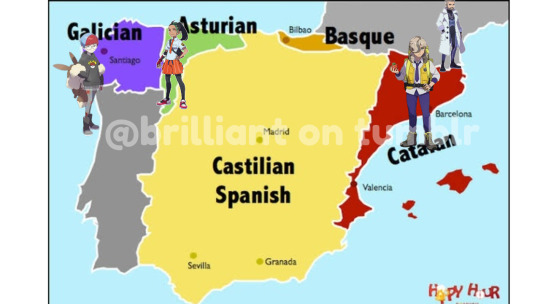
Gotta love how everyone represents a different spanish ethnic group
wip, also kinda cool all the effort they put into design once you look closer.
really cool how the gym leaders are accurate rep of spains ethnic groups and how some of them are based on real people like iono!
as a mixed latino i approve of this AND LECHONK GOTTA LOVE SOME FUTURE CHICARONE
my moms fav pokemon is lechonk she went crazy when she saw the name she thought it evolved into chicarone💀
#pokemon#nemona#pokemon scarlet and violet#arven#arven pokemon#trainer arven#spain#geneology#madrid spain#rival kieran#trainer kieran#is goofy ahh#trainer drayton#crack post#fun facts
54 notes
·
View notes
Text
While more of us are being diagnosed with ADHD than ever, there's still so much we don't understand about the biological mechanisms behind the differences we experience. To begin with, no consistent set of responsible genes has even been identified.
Incredibly, a new study now suggests up to half of inherited ADHD can be explained by single gene variations, instead of clusters of different genes contributing together, as previously suspected.
"Identification of genetic mechanisms specific to ADHD has been challenging," Harvard psychologist Anne Arnett and colleagues explain in their paper.
ADHD manifests with such a complex set of behavioral differences that the idea that it involves groups of multiple genes not only makes sense, but according to some researchers is a forgone conclusion.
But these multiple gene groups have not been able to explain all of ADHD's genetic inheritance.
Studies that considered how multiple ADHD-linked genes are passed on have only observed about a 30 percent rate of heritability.
Continue Reading.
85 notes
·
View notes
Text
In which I try not to be That Guy TM when it comes to Irish ancestors: An exploration of ancestry, diaspora and culture
Because of The Horrors TM in my life atm I've been looking into my biological family tree. I'm adopted but estranged from my adoptive family and I never met my biological family since I was adopted just short of my 2nd birthday. I've been tracing my ancestry for about 3 years now and it's genuinely quite stress relieving to me. It's also fun and challenging from a research standpoint - putting together my own family tree gave me the skills to write articles like this one I wrote in 2022 about historical Welsh queer people, for example.
Lately, I've been finding out more about my Irish ancestors while an adoptee (and thus not knowing any of my biological family) - but also doing this as a Celticist and tired of people doing the 'my sister's friend's cousin's father's mother was Irish' thing. This has created an almost unbearable tension between curiosity at my own ancestry while trying not to be That Guy who finds out about one (1) Irish ancestor hundreds of years ago and is weird about it.
Especially since mine are quite distant ancestors - my great, great, great grandparents were born in Dublin and in a tiny village in County Down called Dunnaman (near Kilkeel). However, they were Irish Catholics and emigrated to Liverpool in the 1870s - all of their subsequent children and grandchildren were born in Liverpool and all of the above + great grandchildren were raised Catholic - including my grandmother (who died before I was born). So there was an obvious attempt to maintain that heritage. There's even evidence my great, great, great grandmother at least spoke Irish (which, as she was born in County Down, would have been Ulster Irish).
The problems with uncritically throwing oneself at an ancestor's nationality:
Now, not all North Americans of Irish (or Welsh, Scottish, Italian, Scandinavian, German etc.) descent do this - but there's a very vocal set of North Americans of Irish descent who find awe and interest in their ancestry - which is actually quite a positive thing! - however, due to either temporal or cultural disconnect, they may end up doing or saying things (and not necessarily with bad intentions) which can have a negative impact on the Irish and the Irish language (or [nationality] and [language(s) associated with that nationality].
I'm reminded of the time an American commented on a Welsh language rights post I made in support of Welsh speakers, but they accidentally ended up using a white nationalist slogan by mistake. It can be a minefield - and with regards to Ireland specifically, mistakes like that can be so much worse. To literally give my own (mild) example, today I decided to relearn Irish (since I haven't spoken any in years since being taught basics at undergrad) and picked up a blank notebook I bought at Tesco the other week, while completely forgetting the inside cover of the notebook was orange. I was planning on decorating the notebook anyway and painted it a different colour. While I know that nobody would really hold it against me if I didn't change the colour, I just know that walking around with an orange notebook filled with Irish I'm relearning because of interest in my Catholic ancestors could be a confusing set of messages, at the very least. If you don't understand why this is, look up the meanings of the colours on the flag of Ireland.
Which is to say, even those of us in Northern Europe who have significantly greater physical proximity to Ireland than North America (and therefore should know better) still can and do get things wrong. And not just benignly wrong like in my case.
The tendency for some North Americans of Irish descent (Canada isn't exempt from this) to conflate Irish ancestry with a contemporary connection to the modern countries located on the island of Ireland as a whole can have results ranging from 'a bit weird' to 'jesus fucking christ'. As a Celticist, I've seen far, far too many Americans of Irish descent try to weigh in on modern Irish politics without any background knowledge or tact at all - and naturally they stake their claim on modern Irish politics entirely on the premise of having distant Irish ancestors. Or, even worse, things start to get all phrenological.
'Irish blood' and the nonexistence thereof:
'Irish blood' is continually evoked by some to validate their sense of 'Irishness' and the obsession with '[insert nationality] blood' is a distinctly North American phenomenon- likely related to or an offshoot of the concept of 'blood quantum', in which enrolment into some Native American nations and tribes is determined by how much 'Native blood' a person has. Notably, many people who would ostensibly have been described under this system as 'full blood' were registered by the US as 'half blood'. This is a method of genocide intended to wipe out tribes and nations by imposing strict measures of who does or does not qualify to enrol into a tribe or nation. This concept seems to have been extrapolated over time (in a North American context at least) into the idea of descent from other nationalities' being measured in a similar or adjacent way. This is how you end up with some North Americans declaring they are '1/8 Italian and 1/4 Irish' on their dad's side etc. While in Europe (where these nationalities hail from, crucially) this practice is seen as a really weird way to describe your ancestry. In general, it's simply 'my 4 times grandfather came from Spain' or 'my great great grandfather on my dad's side came from Finland' etc. if it comes up at all. For various political reasons, many Europeans with descent from multiple other European nationalities may choose to omit to mention descent from certain nationalities, especially if in recent history there has been conflict between their birth nation and an ancestor's nation. The most famous example of this is literally the British royal family changing their surname from the German Saxe-Coburg and Gotha to the more 'British sounding' Windsor in 1917 due to the onset of the First World War.
Where it gets really weird (and also very offensive and rude) is when cultural stereotypes get invoked alongside the whole 'blood' thing in usually quite damaging and/or disparaging ways. I've seen way too many North Americans of Irish descent claim they're alcoholics because they have 'Irish blood' or even worse, claim it's normal to domestically abuse their spouses because of it!! (Genuine thing I have seen btw). Same goes for claiming to be a naturally good chef because of 'Italian blood' and so on. As a general rule, people from the place where your ancestors were from don't generally like to be inherently be considered drunks or prone to violence due to their nationality. Or have weird and inaccurate idealisms projected onto their language or cuisine.
Aren't there any positives?
It wouldn't be fair to make a post like this without mentioning some of the positives that can come from interest in an Irish ancestor. Like I mentioned at the start of this post, I myself felt inspired to relearn Irish because of my own Irish ancestors. I was taught the Connacht dialect at undergrad, however, since my ancestor was from County Down, I'm going to try and learn Ulster Irish instead. One doesn't need Irish ancestors to learn Irish of course - when I learned I wasn't aware I had any Irish ancestors. But being inspired to learn Irish because of an ancestor can't hurt and directly increases the number of Irish speakers in the world (provided you keep at it). This is a net positive for the language as a whole.
Similarly, people who have educated themselves on Irish politics because of their ancestry and genuinely learned something are also a positive thing to come out of discovering Irish ancestors. In my experience, these people are the kind of people I enjoy talking to about being a Celticist because they actively want to learn and respect the cultures being talked about. Which is huge to me!
Conclusion:
As a Welsh speaker whose national identity is more-or-less Jan Morris-esque, my Irish ancestry is an interesting facet of my ancestry I simply didn't know about before. And being an adopted person, I can sympathise with the general sentiment of a lot of white North Americans of feeling disconnected or alienated from any ancestral heritage. The conditions which create That Guy TM as described above rely on that sense of alienation to propagate a very ineffective, tactless and often very insensitive approach to Irish and other European cultures. But the important thing is that that approach can be challenged by people genuinely interested in their ancestry who are also conscientious of the living versions of the cultures their ancestors hailed from.
For me, that means learning Irish in a dialect my ancestors are likely to have spoken. I also visited the library today to check out some books on the Irish emigration to England and the sociopolitical reasons behind that emigration. I know the broad strokes, but the details are desirable to know to get a better idea of the why and how the country of my birth had a hand in creating the conditions which led my ancestors to emigrate in the first place. I think the world would be a better place if people took the time to understand the history and politics of ancestors which don't share their nationality.
As always, reblogs and thoughts are welcomed and encouraged!
Thank you for reading to the end - and if you'd like to support me, please see my pinned post. Diolch!
#long post#Ireland#Irish#Gaelige#Celtic Studies#Celticist#Irish diaspora#Irish americans#blood quantum cw#racism cw#(just in case)#ancestry#geneology#family history#I've probably made typos but it's 11:40pm and I need to go to sleep
49 notes
·
View notes
Note
Jewish culture is needing to periodically trace back genealogy instead of doing it in a single period of time because you keep running into dead ends thanks to the Shoah and the pogroms that caused your ancestors to emigrate to America. Then it’s all about fighting low key jealousy that some of your gentile friends can trace back their lineage to the 18th century 😑
(Ps I’ll be stunned and thrilled if I’ll be able to trace farther back in my paternal line than my great grandfather- given his hometown was destroyed by a pogrom in the 1920s. Then there’s the Shoah, and the fact that Putin probably has destroyed the national archives in Kiev through bombing tf out of Ukraine 😑. Even if he didn’t, there’s still the Shoah, and the high chance family records of Ukrainian Jewish ppl were destroyed 😣. I’d face something similar on my mother’s side, but her side emigrated to the States a generation prior. I found some tentative great great (great?) grandparents bc there’s some large families on that side.)
.
#jewish culture is#judaism#jewish#jumblr#geneology#lineage#ancestors#ancestry#shoah mention#tw shoah#cw bombing#bombing mention#holocaust#tw holocaust
26 notes
·
View notes
Text
The Holmes Family Tree

At the top are the parents. Sherlock's father; Sieger, Sherlock's Mother, Violet Rutherford; and Sherlock's Stepmother Eudoria
First lets start with Violet and Sieger's children:
Sherlock, Sherringford, Mycroft, Shirley, and Rutherford
Then there are Eudoria and Sieger's Children:
Enola, Sigrina, and Siegerson.
Let's start with the branch that descends directly from Sherlock.

I have placed Sherlock's Children as five in Number. Raffles is the son of Majorie Raffles (the sister of A.J Raffles). Henry Holmes and his wife Elizabeth are the creations of the Charlotte Holmes series.
Keep Sherlock Holmes Jr in mind as we'll focus on him later. We'll go down Henry and Elizabeth's line.

Pascal, Valentina, Agatha, Perpetua and Johnathan Holmes are the children of Elizabeth and Henry

Crispin and Morland are Pascal and Elizabeth's sons. Crispin marries Celine, and Morland marries May. Keep Morland in mind.

Crispin and Elizabeth have the following children: Alistair, Agatha, Julian, Leander.
Morland is a complicated old bastard with two sons: Sherlock and Mycroft. Note that i've written Elementary beneath them.
Alistair and Emma have: Milo and Charlotte
Julian and Kim Min-Ji: Margarate Holmes, Carmilla Holmes, and Sherlock Holmes (Sherlock & Co.)
Now let's move to the side along the chart and go back to one of Sherlock's children.

Sherlock Jr is a problem, I've decided. He is the start of a parallel branch. He had some unknown son. then that son would in time go on to sire the lineage that produced the following
Euris, Mycroft, and Sherlock (BBC's Sherlock). Euris would then later bear a child with a descendent of Moriarty. Resulting in Ron Kamonohashi.
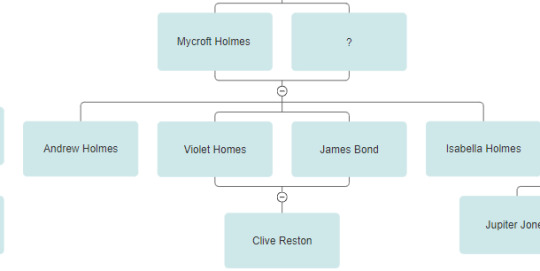
Mycroft has a smaller branch. Three children:
Andrew Holmes, Violet Holmes, and Isabella Holmes.
Violet Holmes would then have a child later with James Bond, resulting in Clive Reston.
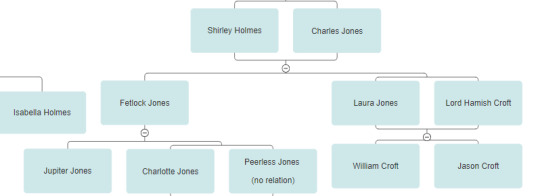
Shirly Holmes would marry Charles Jones. Resulting in the birth of Fetlock Jones and Laura Jones.
Laura Jones and her husband Lord Hamish Croft establish the lineage that would come to result in Laura Croft.
Fetlock's is Jupiter, and his daughter Charlotte marries Peerless Jones.

The following children of Peerless and Charlotte are: Barnaby, Darwin, and David.
David Marries Judith Walton and has three children: Fred Jones Sr, Martin "Merlin" Jones, and Ellie. Fred Jones Sr later illegally adopts a son, naming him "Fred Jones Jr".
Barnaby has a son named Harold and a grandson named Jebediah Romano Jones.
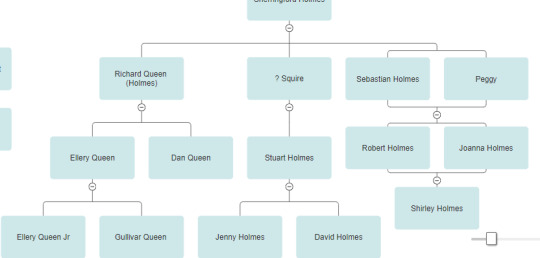
Sherringford Holmes, the older brother of both Mycroft and Sherlock, would have three children. Richard, an unknown country squire, and Sebastian.
Richard would change his surname to Queen in the United States to establish himself as an independent detective. He has two sons, Dan and Ellery Queen.
Ellery has two sons: Ellery Junior and Gullivar.
The Squire has one son: Stuart. Stuart has two kids, Jenny and David.
Sebastian marries a woman named Peg: Through them they have a son named Robert who becomes an ambassador for the United Kingdom.
Robert and his wife Joanna then later have a daughter named Shirley Holmes (many of her name).
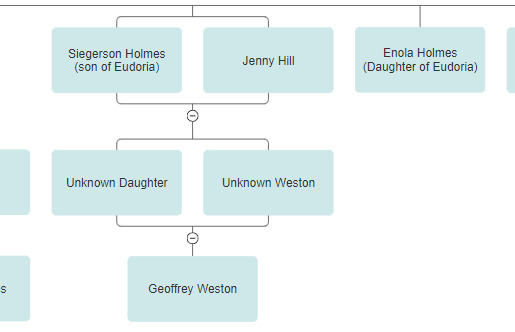
Rutherford is Sherlock's twin brother and a vampire (making him a genetic dead end).
Sigerson Holmes (son of Eudoria) marries Jenny Hill, a descendent of Fanny Hill. Their daughter then marries a Weston and have a son named Geoffrey Weston.
I wasn't sure how to fit Enola Holme because, as far as I know,w she doesn't go on to have anyone I can identify as being a possible descendent. (good for her.)

Lastly, Charlotte Holmes. I also believe that Charlotte was having an affair with Mary Watson, but that is neither here nor there. She marries some fuck-off prince named Rupert of Kravonia and they have a son: Alexander (i accidentally named him Rupert as well in the image).
Sirgrina and John Vanstattart Smith have three Children:
Dennis Nayland Smith, Violet Smith, and John Smith.
Dennis Nayland fathers: George, Harold, and John "Hannibal" Smith.
Violet marries a man named Sneed and has a son named Lancaster "Shockwave" Sneed. A supervillain from Marvel Comics who used to beat the fuck out of Shang-Chi.
Thus concludes the family tree of The Holmes. Please reblog or message me if you have questions or comments.
#Sherlock Holmes#Sherlock fandom#bbc sherlock#Enola Holmes#Mycroft Holmes#elementary cbs#Elementary Sherlock#Sherlock Fanon#Holmes & Co.#sherlock & co#ron kamonohashi#James Bond#Clive Reston#fred jones sr#Fred Jones Jr#fictional geneology#geneology#Shirley Holmes#eurus holmes
12 notes
·
View notes
Text
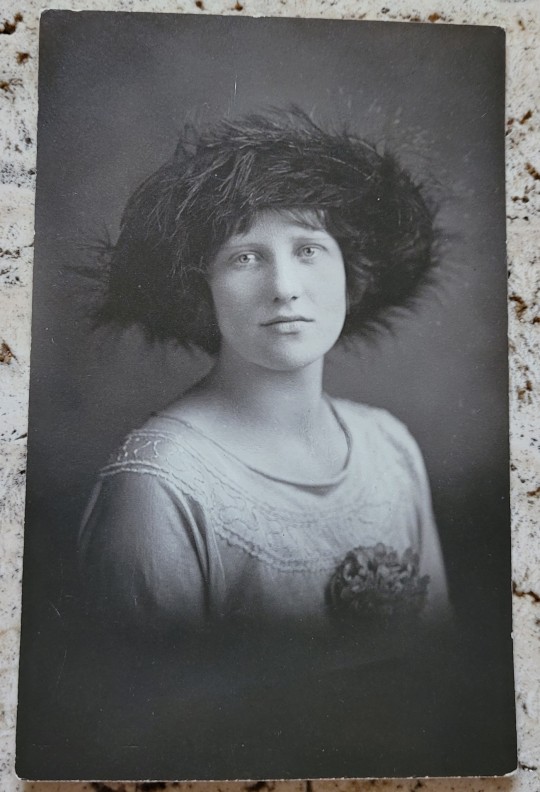

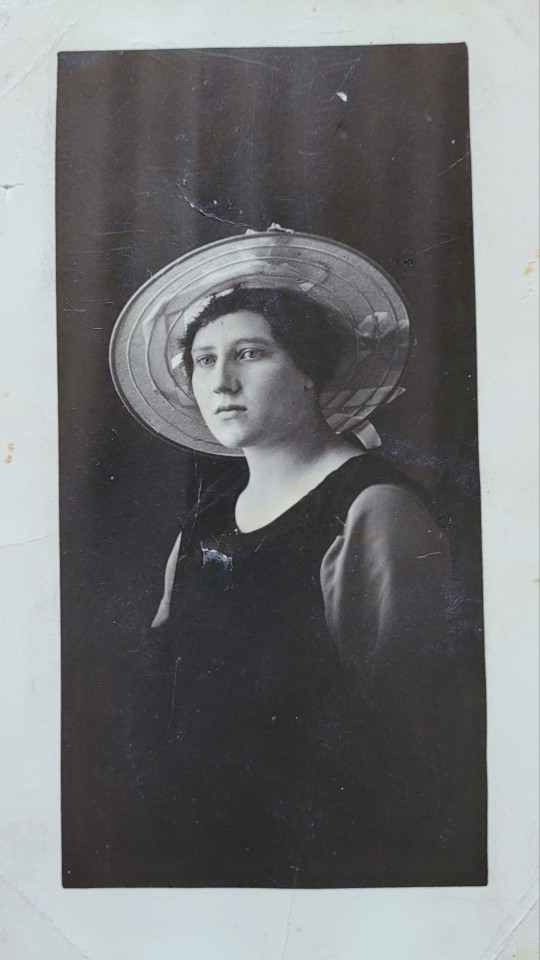
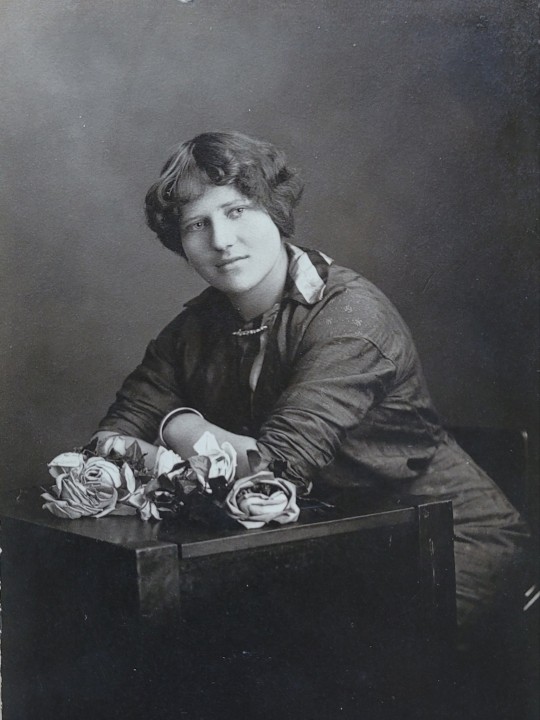

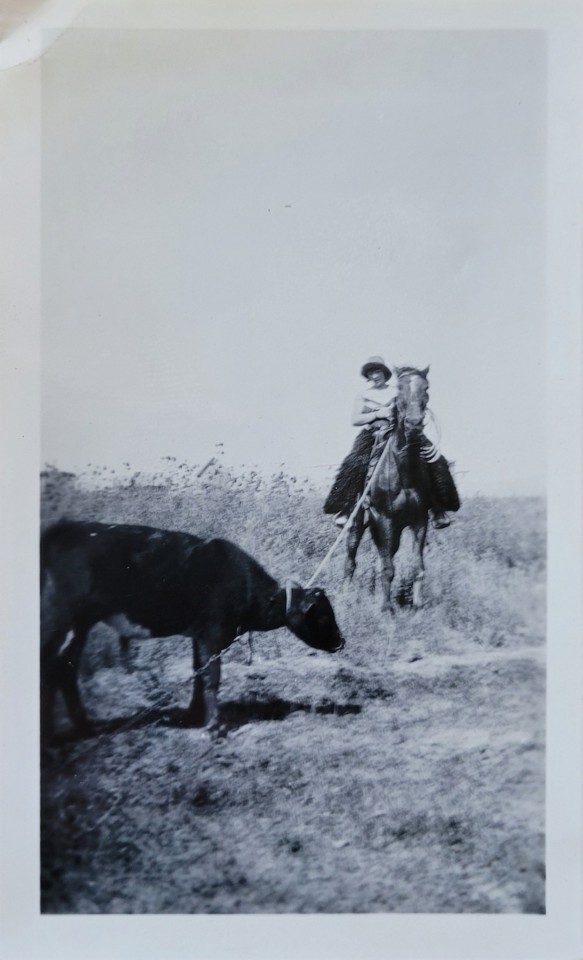
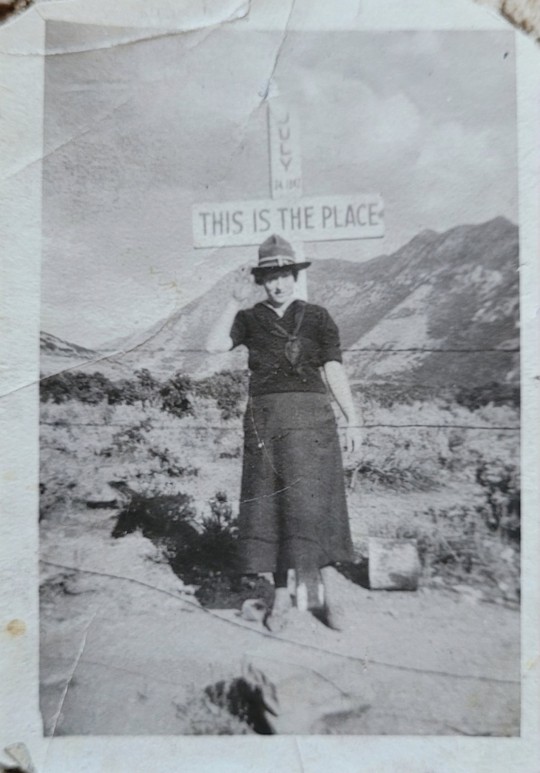
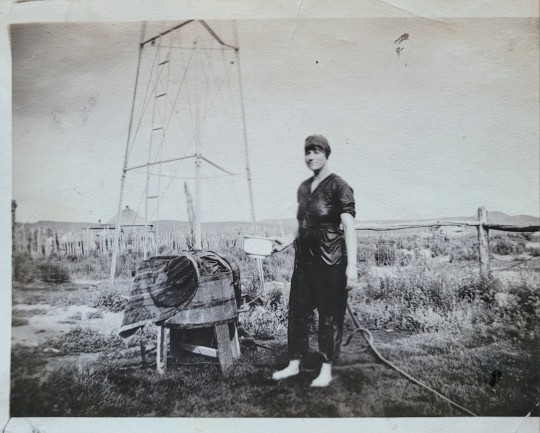
Appreciation post for great great grandma Arvella (1895-1968)
#vintage#vintagecore#vintageblr#vintage aesthetic#vintagecollector#vintage collector#vintage photos#vintage photo#antique photos#1910s#1910s fashion#1940s#1940s fashion#ancestry#family history#geneology#old family photos#vintage family photos
19 notes
·
View notes
Note
Hello!
Sorry, I found this post, and was wondering. Do you know how to get the baby's name? Or was the annotation different?
https://www.tumblr.com/petermorwood/676099233232945152/salparadisewasright-irisharchaeology-love
The easy way would be to check the 1921 census and see what name the now ten-year-old daughter of that family was given.
At least it would be easy if the 1921 census was on-line, but it isn't. :-P
10 notes
·
View notes
Text
I'm spending actual money on finding out things like I had an ancestor named Sylvester Sylvanus and that another ancestor had 6 horses, 3 milk cow, 2 working oxen, 34 sheep and 2 pigs in 1860. Also he had more bushels of oats than anyone in the region.
*this* is what genealogy should be about, not finding your old crusty great great great was on the Mayflower.
30 notes
·
View notes
Note
Hi, Reid, I have a family story that one of ancestors died in a concentration camp, but have, as of yet, been unable to confirm it. Do you have any favorite websites or sources for that information?
Hi there, dirtling. I'm sorry that it's taken so long for me to get to this. My life has been a little hectic, and I wanted to be able to give it the time an attention that it deserves.
Without knowing the details of your particular situation, it's a little difficult for me to give precise advice, and I'm also not a genealogist/expert. That being said, there's some baseline information that will help narrow down your search. As a first step, I would encourage you to track down:
Name
Age/birth year
Country of origin (this can help determine which camp they wound up in if you don't know already)
The year they were captured by the Nazis (this will help you weed out records that are too early)
Names of relatives or people they were deported with (can be useful for distinguishing between multiple people with the same name)
Basically, try to compile as complete a profile as you can. Reach out to the elders in your family and record what they tell you.
From there, I would try to figure out which camp they went initially went to. This may not be where they ultimately were murdered, but the records trail should begin there. There are so many camps that it's not really feasible for me to go through and find out how to access the records for each one, but my guess is that for most places, records are accessible to some degree.
Here are some resources that might be good places to start:
United States Holocaust Memorial Museum, Database of Holocaust Survivor and Victim Names
Arolsen Archives, Information for relatives of victims of Nazi prosecution
Remember.org, Tracing family members lost in the Holocaust
The Zekelman Holocaust Center, Tracing survivors and victims
JGSB, PDF of resources and research tips for finding Holocaust victims
I hope that you are able to find the family member you are looking for. May their memory be a blessing.
-Reid
55 notes
·
View notes
Text

ancestry mexico is the cheapest. reblog to save a wallet
#tell your old folks who use it to do this#their subscription pricing is bullshit but i have a family member extremely interested in learning our heritage so we're all getting it don#fight back against predatory companies taking advantage of my sense of familial obligation!#ancestry#heritage#geneology
8 notes
·
View notes
Text


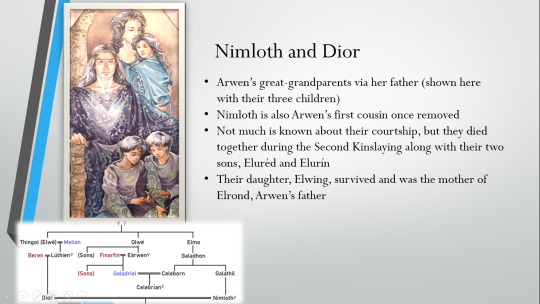
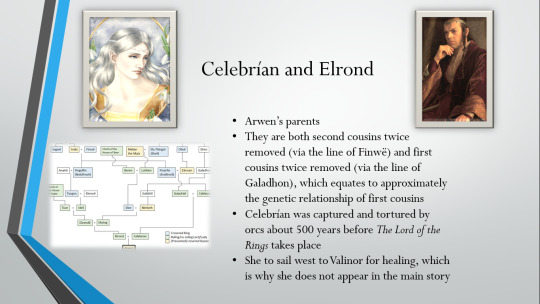

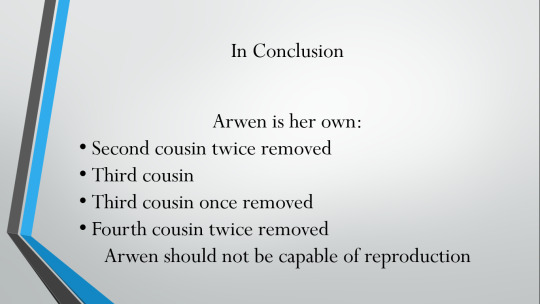
I made a PowerPoint for the English club at my school and I thought y'all might appreciate it.
Art of Dior and Nimloth is by Jenny Dolfen.
Art of Celebrian is by Veronnikka of Deviantart and posted on tumblr by @elf-esteem who might be the same person? Idk
#silmarillion#elrond#arwen#lord of the rings#aragorn#powerpoint presentation#galadriel#celeborn#dior#nimloth#elwing#elurin#elured#celebrian#family trees#ancestry#geneology#there is so much incest in this family tree#it's a miracle they don't look like habsburgs
19 notes
·
View notes
Text
Part 2

I'm not quite sure how to start a story that has pledged my family for 3 generations, so forgive me if I seem to bounce all over the place. My part of this story begins when I was 4-5 years old. I am taken care of by my grandparents, they live in a cute, modest home in California. This home has a beautiful pool, this pool becomes my sanctuary. To this day, I am still drawn to water. This pool is where my abilities started. I remember a man who would always visit me when I was swimming. The first time I saw him I was roughly 4 or 5. I was swimming underwater and saw legs and feet dangling in the pool like someone was sitting at the edge with their feet in the water. For some reason, this person still had their shoes on. Shiny black shoes, the kind people wear when they're getting dressed up. I don't remember talking with him that day, but I saw those shoes often.
#true ghost stories#true story#true#ghosts of the past#ghost stories#haunted#generational curses#generations#geneology#ancestry#adoption story#horror#depression era#part 2
3 notes
·
View notes
Text
A research team from the University of Cologne, in collaboration with colleagues from the Leibniz Institute for Food Systems Biology in Freising, has discovered a receptor for bitter taste in twelve different cartilaginous fish (sharks and rays). The receptor belongs to the so-called taste receptors type 2 (T2R), which also make humans perceive bitter and potentially toxic foods.
Until now, it was assumed that such receptors only occur in bony vertebrates. The work was published under the title "A singular shark bitter taste receptor provides insights into the evolution of bitter taste perception" in the Proceedings of the National Academy of Sciences.
In the past, molecular research has had limited information on sharks, as their genomes are often relatively large. Therefore, sequencing is often more complex and takes longer than with many other animals. However, the techniques are more advanced nowadays, providing ever more information on the gene sequences of many cartilaginous fishes.
This enabled the neurobiologists lecturer (Privatdozent) Dr. Maik Behrens and Tatjana Lang from the Leibniz Institute for Food Systems Biology and Professor Dr. Sigrun Korsching at the Institute of Genetics of the University of Cologne to specifically search for bitter taste receptors in cartilaginous fish.
Continue Reading.
50 notes
·
View notes
Note
hey hope yr good! was wondering if u have any tips on researching yr ancestry? diolch!
Thank you for the ask! I go about my ancestry research in a very specific way, but I'm happy to describe what I tend to do.
Researching your ancestry (or the ancestry of historical people etc.):
My number one tip for researching ancestry is having perseverance and patience in spades. It's important to know going in that you will get led up blind alleys, dead ends and amass plenty of non-starters, but don't get put off by this! In my experience, the information you're looking for is there, but you have to get real creative about how you go about finding it. Subscriptions to genealogy sites can be helpful too, but aren't a necessity if you're only interested in going a few generations back.
My number two tip is that in general, you will have more information starting out than you think you do. To use myself as an example, when I sat down to research my ancestry, all I knew about my biological family was my birth mother's name, birth city and date of birth - my grandparent's names and dates of birth and a few patchy bits of information about aunts etc. That was 3 years ago. Since then, I've been able to trace ancestors to the second half of the 17th Century. I don't know anything about my biological father's side, so my research was all matrilineal. Starting with my grandparents, I was able to cross-reference entries in the register of births to confirm I had the right people. Once you successfully do this, you can then start on locating your grandparent's parents. In my case, I went from knowing about 2 ancestors to 6 - adding in the 4 which are my matrilineal grandparent's parents. Then repeat the process as far back as evidence and records will allow.
My number three tip concerns the how of researching ancestors. It's all well and good saying 'confirm if X is the parent of Y' but how that's done is another matter.
Taking my own ancestors, lately I've been looking into my Irish ancestors. My matrilineal grandmother's maiden name begins with B [full name redacted for privacy] (naturally you'll need to acquire maiden names of female ancestors for certain bits - this can be done by speaking to family members if that's possible, or by ordering a copy of their marriage certificate. General Register Office index records in the UK will also display maiden names and appear on mainstream subscription genealogy sites). Having ordered my grandmother's marriage certificate and found her GRO index record, I was able to find her maiden name B. as well as her father's name. So then the next step is to find records of that name which match known details (e.g. the marriage certificate usually lists a profession, in the case of my great-grandfather, he worked in sheet metal).
In order to identify my great-grandfather with 100% certainty, context like my grandmother's place of birth (Stockport) and year of birth (1950) theoretically places him in Stockport around that year (given 9 months leeway at least) - there's exceptions such as if a male ancestor died before their child was born or if they were never in the picture, but generally this is a rule of thumb. The next thing to do is find records of my great-grandfather in Stockport around 1950 - give or take ~10 years (this is more difficult with more recent ancestors due to census data not being available for most of the 20th Century yet). If one were to look at the 1939 Register (accessible via mainstream genealogy sites and in-person at Kew for free) a person matching my grandmother's father's first name, middle name and surname and who is married and worked in sheet metal is recorded in the same district my grandmother would be born in in 1950. A good start - but as with any good research, you gotta corroborate. In most cases, it would be fine to presume at this point that the woman my great-grandfather is married to in the 1939 Register is my grandmother's mother. However, upon checking the GRO Index of births, my great-grandfather and his wife's name do not come up when searching for my grandmother's birth record. Instead, my great-grandfather's name comes up with a different name. To be brief, the actual situation is that he separated from his first spouse before my grandmother who was born. Thus why his wife in 1939 *isn't* my great-grandmother. Upon checking the second spouse's name against the GRO index, my great-grandfather married her in the 1980s (thus legitimising my grandmother - one can only assume the law and taboo around divorce led to the delay in marrying his new spouse). Great-grandmother's name confirmed.
So that gives me both my great-grandparent's names. But sticking with my great-grandfather, lets say I want to trace his father. Knowing more detail about my great-grandfather's later life means I can double check details of his early life. After having ordered his marriage certificate with his second wife (most certificates on the GRO are about £11 with second class post) I find out his father's name. Through that, I repeat the process above to verify and corroborate his father's details to match him 100%. Assuming by now I have my great-grandfather's parent's names through this method, I can locate his birth record on the GRO index and find my great-grandfather was born in 1912 in Liverpool.
And so on and so forth. If you're not in the UK you'll have to look up what resources (paid and free) are available in your country - but some records are possible to find online. My ancestors above were Catholic, so this resource was no use to me. But the Church of England Parish Clerk records for Lancashire are available online here, for example - with similar sites existing for other counties. Another thing is to make use of Boolean commands on Google. Typing "ancestor name" "[year]" "[city or town]" can bring up results - e.g. digitised books, records and newspapers in the public domain are indexed by Google and if you ancestor is mentioned in any of them, they will come up. This happened for me with an ancestor on my grandfather's side - some County Councils keep some historical records online and it turned out one of my ancestors had had sex with two men in 1769 (I guess it must have been the Summer of 69 tbqh!) who were both possibly the father of her child - the court decided they both had to pay child support to the parish (who actually raised the child ).
But remember that you can easily be led up blind alleys, so my biggest tip is still to corroborate and check your work as you go along. Like with my example, if I assumed my great-grandfather's first wife was my great-grandmother, I would have gone completely in the wrong direction. Historical records have a habit of being slippery fish so it's good practice to be critical of sources and make sure you're clear on the timeline of things. If you're using a paid genealogy site, getting things wrong or assuming things can affect other users (if they see your family tree and it has wrong information in it, that can mislead people down the wrong path as well). I've seen this mostly with North American users who might get a fact wrong about a European ancestor and will not notice, causing a lot of headache in setting the record straight. Carelessness from other users pollutes the timeline and can make it difficult for others to research an ancestor you have in common with them if you get it wrong. If you're researching an ancestor who is only a theory or a hypothesis, there are tags you can put on that ancestor's page which show they're a hypothesis/theory - which can really help others know so they don't take the information you have on the ancestor as fact. Despite this, still have fun with it and enjoy finding out more about your relatives - I hope that you're able to find this answer somewhat useful.
If you (or anyone else reading this) has any more questions, you are very welcome to make a comment or send another ask.
Good luck! Pob lwc!
#luke's originals#ask#gofyn#transs3xualmagg0t#ancestry#family history#family tree#family historians#ancestors#ancestor research#geneology
16 notes
·
View notes
